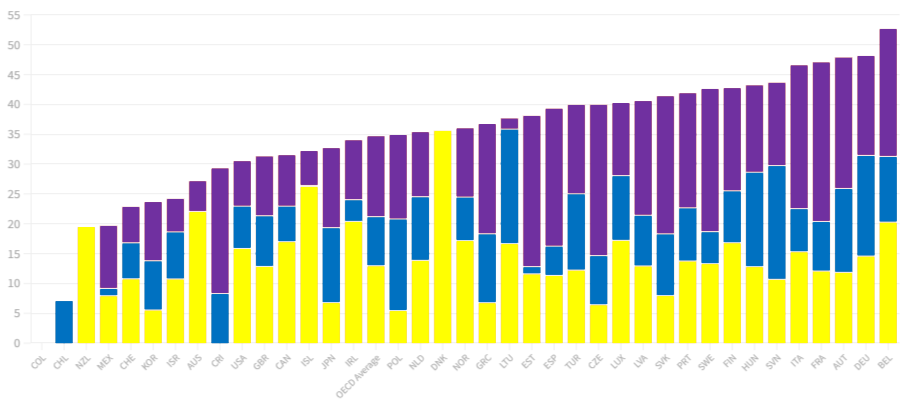_ Yuri Kofner, economist, MIWI Institute. Munich, 23 August 2022.
Reasons for the rising costs: Corona politics and demographics
During two serious economic crises, Health Minister Karl Lauterbach (SPD) announced a massive increase in the average additional contribution to statutory health insurance (GKV) by 0.3 percentage points to 1.6 percent.[1]
In 2021, the statutory health insurance funds spent 284.3 billion euros. In 2021, the government injected 14.5 billion euros.[2]
Due to rising costs and a falling number of net contributors, caused in particular by the aging of the German population and the mass immigration of low-skilled net recipients of social benefits, the state subsidy requirement for GVK will have to increase to 83 billion euros in 2030.
Expenditure has increased in particular due to the obligatory corona measures (tests, vaccinations, etc.).
If the federal government’s current priorities and policies remain in place, an increase in social security contributions is logical. However, Germany already has the highest social security contributions of all OECD countries after Belgium (Ill. 1).[3] Raising them further during the current inflation and energy crisis would be particularly cruel.
Ill. 1. Taxes as a percentage of labor costs for the average single worker in different countries (2021)

Source: OECD. Description: Income tax (yellow), employee social security contributions (blue), employer social security contributions (purple).
Funding from other sources
Instead, in the short term, it would be perfectly possible to increase the government subsidy for compulsory health insurance if the government decided to save elsewhere. Just three examples:
Since March 2020, the corona health measures (tests and vaccinations) have cost the state over 16 billion euros.[4]
Corona aid and loans for companies as well as short-time work cost the state over 130 billion euros in 2020-2021.[5]
Instead of implementing these costly corona restrictions, the money could have been used to finance statutory health insurance.
According to conservative estimates, the accommodation and integration of asylum seekers costs the state around 37 billion euros a year. This is without social benefits. Even according to official guidelines, less than half of the asylum seekers have a right to stay in Germany. According to this, a consistent deportation policy would release at least 19.5 billion euros annually.[6]
Reducing costs
Another way would be to reduce the expenditure of the statutory health insurance companies. A quick and easy way to do this would be to permanently reduce the VAT on pharmaceuticals to the reduced tax rate of 7 percent, as demanded by the AfD. This would relieve the GVK system by 2.4 billion euros annually.[7]
Long-term measures
In the long term, the federal government must bring the demographic balance back into the healthcare system. This can be done by relieving families with many children in the contribution system and a correspondingly fairer burden for those without children. [8]And of course the mass immigration of welfare recipients into the German healthcare system must be reversed.
Sources
[1] Tagesspiegel (2022). Krankenkassenbeitrag soll 2023 auf Rekordhöhe steigen. URL: https://www.tagesspiegel.de/politik/karl-lauterbach-kuendigt-an-krankenkassenbeitrag-soll-2023-auf-rekordhoehe-steigen/28462344.html
[2] Wild F. (2021). Die zukünftige Entwicklung der GKV-Finanzen – Ein Beitrag zur Diskussion um erhöhte Steuerzuschüsse. Wissenschaftliches Institut der PKV. URL: https://www.wip-pkv.de/fileadmin/DATEN/Dokumente/WIP-Kurzanalysen/WIP-Kurzanalyse_GKV_Bundeszuschuss.pdf
[3] OECD (2022). Taxing Wages 2022. URL: https://www.oecd.org/tax/taxing-wages-20725124.htm
[4] Rauch S. (2021). Was die Pandemie den Staat bisher kostet. MDR. URL: https://www.mdr.de/nachrichten/deutschland/panorama/corona-pandemie-kosten-schulden-impfung-tests-masken-100.html
[5] BMWK (2022). Informationen zu Corona-Hilfen des Bundes. URL: https://www.bmwk.de/Redaktion/DE/Coronavirus/informationen-zu-corona-hilfen-des-bundes.html
[6] Kofner Y. (2022). Remigration through development aid: a new approach. MIWI Institute. URL: https://miwi-institut.de/archives/2080
[7] AfD (2020). Sozialkonzept. URL: https://www.afd.de/sozialkonzept/
[8] Kleinwächter N. (2018). Generation-fair pension: the new three-generation contract as the future of old-age provision in Germany. MIWI Institute. URL: https://miwi-institut.de/archives/2055
